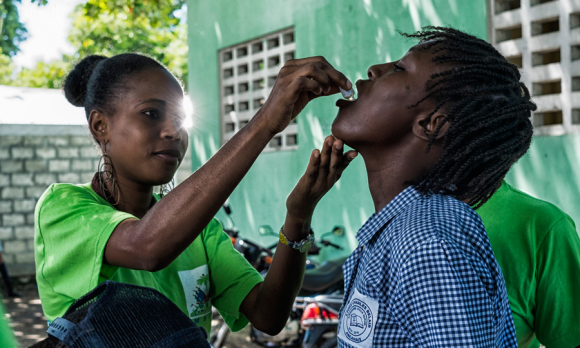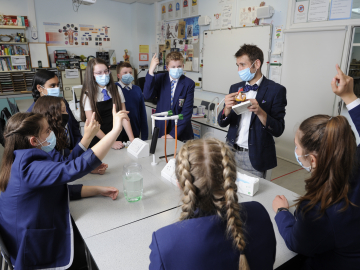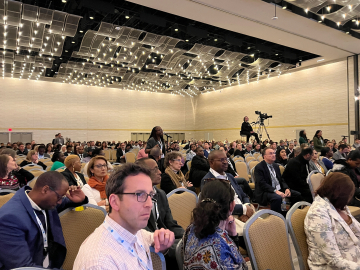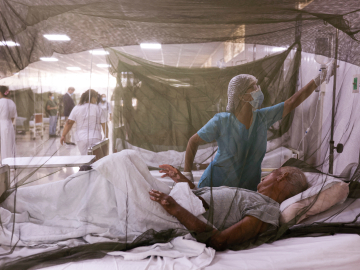The Top 10 GHN Exclusives of 2016
From our World Health Assembly coverage to our Untold Global Health Stories of 2016 series on Konzo, it's been a busy year for GHN exclusives. Here's a sampling of our top 10, featuring some of our most intriguing commentaries and interviews.
Bitter Harvest: Cassava and Konzo, the Crippling Disease
When impoverished people have little to eat but insufficiently processed cassava, it can lead to the irreversible paralytic disease konzo—the Untold Global Health Story of 2016.
Science journalist Amy Maxmen and photographer Neil Brandvold traveled to the DRC to put a human face on the suffering—showing that despite the crushing poverty, people affected by konzo have the same hopes as anyone—to be healthy, to lead productive lives, to fall in love. Maxmen describes steps to stem the disease—but concludes that ultimately, ending extreme poverty is the only answer.
Amy Maxmen, Global Health NOW Untold Story Series
“Should I Go Home?” and Other Utterances
In Professor Aronson’s opinion piece, recent “post-election angst” stemmed not from who holds office but what was unearthed during a volatile election year—painful and growing divides in communities where “othering” has become commonplace and even seen as acceptable. Answers lie in open, empathetic dialogue and collectively holding elected officials accountable.
Robert E. Aronson, Global Health NOW Commentary
Margaret Chan’s 3 Slo-Mo Disasters
Climate change, antimicrobial resistance and noncommunicable diseases are the “3 slow-motion disasters” that will end civilization as we’ve known it if we don’t act soon, warned WHO Director-General Margaret Chan in May at this year’s 69th World Health Assembly—and “These are not natural disasters,” she emphasized.
Brian W. Simpson, Global Health NOW Special Report
Desperately Seeking Leadership: MSF’s Joanne Liu on WHO’s Next Director-General
When Ebola hit West Africa in 2014, Médecins Sans Frontières (MSF), under the leadership of Joanne Liu, MSF's International President, pressed for the world to wake up. Now, in WHO director-general elections, Liu urges the WHO to put lives before politics: “We need someone at the helm who will restore trust, and inspire us … that is what will encourage people to invest.”
Dayna Kerecman Myers, Global Health NOW Q&A
The Long View: Refugee and Migrant Health
Traditional strategies for delivering health services to today’s 65 million refugees and migrants are failing, agreed experts at this year’s UN General Assembly in September. We need to change the tone, and stop thinking of refugees as a problem to be solved, and explore new paradigms that quickly integrate the displaced into their host country’s society instead.
Brian W. Simpson, Global Health NOW Special Report
Faith and Family Planning: A Q&A with Sheikh Mangala Luaba
Muslim leader Sheikh Mangala Luaba discussed Quran-based support for family planning and his efforts to promote the practice in his native Democratic Republic of Congo at this year’s International Conference on Family Planning in Indonesia. “We found that family planning corresponds with the Quran. It is a good thing,” said Luaba.

A health worker administering the oral cholera vaccine in Arcahaie, Haiti. UN Photo/Logan Abassi
Shrinking the Cholera Map
Making the oral cholera vaccine more widely available and administering it strategically will drastically reduce the number of cholera patients globally, argues Dr. David Sack of the Johns Hopkins Bloomberg School of Public Health. All that’s needed now is the global will.
3 Key Steps After the UN Political Declaration on AMR
The growing threat of antimicrobial resistance prompted the UN General Assembly to convene in September for only its 4th-ever high-level meeting on a global health issue. At the summit, stakeholders announced the 3 essential ingredients for tackling the threat: implementation of a political declaration, financing, and transparent monitoring and access.
Anthony D. So & Reshma Ramachandran, Global Health Now Commentary
Cheap Milk Substitutes Endanger Babies
2016 Untold Global Health Stories Contest Honorable Mention: nutritionist Afifa Tanweer tells the cautionary tale of malnutrition in Pakistani babies who are fed a cheap milk substitute sold primarily as tea whitener (think: coffee creamer). Tanweer calls for interventions from health practitioners to educate new parents, and better labeling and advertising practices from tea whitener manufacturers.
Afifa Tanweer, GHN Untold Story
Pokémon GO!—Pandemic or Prescription?
This summer, tens of millions took to the streets—phone in hand—in search of elusive virtual beasts. It marked a social, or health, experiment on a global scale, prompting this team of researchers to examine the pros—getting people off the couch—and the cons: injuries and Pikachu dependence.
Alain Labrique, Yorghos Carabas, Michelle Colder Carras, and Bruce Y. Lee, Global Health NOW Commentary




